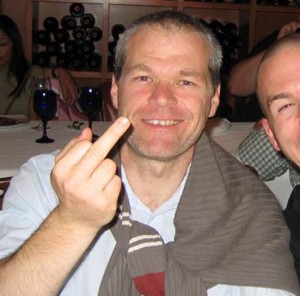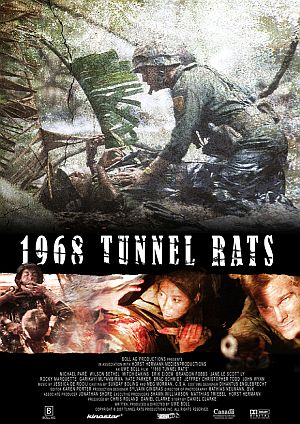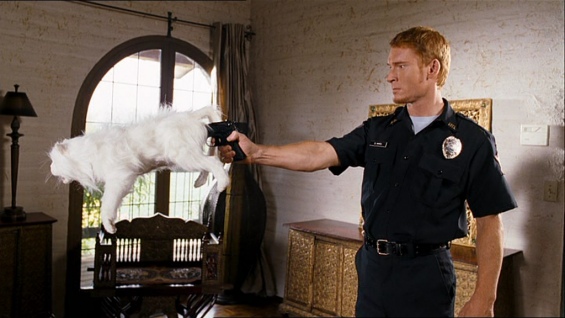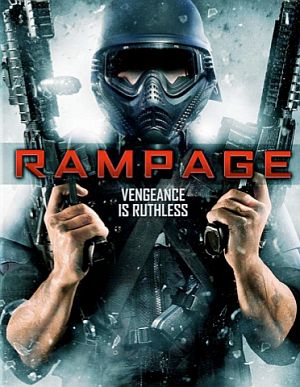Uwe for Boll-ywood: The Competent (and other) Films of Uwe Boll
If you don’t know who Uwe Boll is, a Google search will enlighten you. After the obligatory IMDB, Wikipedia and Rotten Tomatoes pages, the next links go to a New York Times article, which opens, “Uwe Boll is often referred to as the worst filmmaker in the world,” the now-defunct StopUweBoll.org, an online petition against the man with over 350,000 signatures, and an unpleasant exchange of emails with Wired over their unfavourable review of Postal. If you need more, both House of the Dead and Alone in the Dark are firmly ensconced in the IMDB bottom 100.
It’s no coincidence that both these are video-game adaptations. as are most of Boll’s most critically-panned works, e.g. Bloodrayne and In the Name of the King: A Dungeon Siege Tale. Hell hath no fury like a video-game geek irked, and they’re usually tech-savvy enough to shriek endlessly about their nerdrage online, to other video-game geeks. And actually getting a reaction from him puffs up their egos: he’s a lot more accessible and open about his feelings than. say. Michael Bay. Boll doesn’t seem to mind criticism, per se: in interviews, what he has railed against is hypocrisy – those who tell him to his face they like his movies, then bash it – or those who pre-judge his work. And I can see his latter point in particular: Bloodrayne made it into the IMDB bottom 100 before it was even released, thanks to the work of those I call “the Boll weevils”.
Mind you, I can see his enemies’ point too. While I enjoyed both House of the Dead and Bloodrayne more than most, I wouldn’t call either “good”, while Bloodrayne 2 is pretty close to unwatchable, and Far Cry isn’t much better, even with the godlike presence of Udo Kier. Basic rule of thumb: when Boll makes movies based on video-games, the results are likely to be uneven, and that’s putting it mildly. While those represent his bread-and-butter, his career his covered other territory too. We previously reviewed Heart of America, which is unspectacular but certainly not deserving of vitriol, and below, we look at some of Boll’s recent output, both in and outside of the genre for which he is best-known.
Darfur
Star: David O’Hara, Hakeem Kae-Kazim, Noah Danby, Sammy Sheik
TC Top 10 Film: 2011. This is an extraordinarily fucked-up film, but then, it is about an extraordinarily fucked-up situation. While you’ve probably heard about the situation in Darfur, it’s something that is vaguely “over there”. The harsh reality is that it’s one of the nastiest civil conflicts of recent times, with the Sudanese government supporting, covertly and otherwise, militias who operate against the local independence groups. Both groups are Muslim, but the conflict is loosely between ‘Arab’ and ‘African’ factions, and has lead to the deaths of hundreds of thousands, both directly through fighting, and of disease, starvation, etc. It’s an unholy mess, which I knew little about, until the film provoked me to look into the background – managing that is a rarity, and gives you an idea of its impact.
A group of Western journalists join an African Union patrol of “observers” as they head off to a remote village; on the way, they stumble across a mass grave, evidence of the ethnic cleansing carried out by the Janjaweed militia. While the village inhabitants are poor, and some have horrific tales to tell, they don’t seem in danger – but when the convoy is leaving, a cloud of dust in the distance alerts them to the Janjaweed forces, making a bee-line for the locals. Hoping the presence of cameras and the press will dissuade the militiamen from further atrocities, they head back to the village for a face-off. It doesn’t go as well as they hope.
The DVD sleeve – which also re-titles the film Attack on Darfur, since obviously no-one in America knows what a “Darfur” might be – does the film a massive disservice. Where in the movie are the helicopters it shows? In this case, an accurate depiction would be a massive turn-off, and I can forgive the deception, if it fools a few people into getting their eyes opened. For this is grim viewing, that has a sense of impending tragedy from the opening, and delivers it in full, to the point of being tough to watch. Rape, cold-blooded murder, babies on spikes… No, seriously: babies on spikes. I refer you to my previous, “extraordinarily fucked-up” comment. Kudos to the leads, who handle the largely improvised dialogue with aplomb, and also regular Boll collaborator Jessica de Rooij, who produces a fine, haunting score.
What doesn’t work? Most obviously, the hand-held camera. Yes, it’s done to create a documentary “feel,” even if most actual documentaries these days are much less wobbly. Here, it does more to take the viewer out of the moment, as they’re thinking “Why is the camera shaking so much?” Or, in Chris’s case, have to leave the room entirely due to motion sickness [Dear Uwe; please make a good film with a static camera, so my wife can watch it. KTHXBAI]. The ‘celebrity’ presence as the journos is also somewhat distracting, as you’re forever seeing Max Headroom, Bloodrayne or the kid from T2 in the background.
I am also somewhat uneasy about Boll’s use of genuine Sudanese refugees to play the villagers, who consequently get to relive situations similar to those that drove them out of their country to begin with. At best, it can’t have been much fun, and at worst, it’s exploitation. I’m assuming they weren’t paid standard SAG rates, though the simple retelling of their stories is part of what creates the looming sense of doom. Overall, however, even if the “entertainment” value here is low, there’s no denying this packs an immense wallop, and it should be Exhibit A for those who still associate Boll with nothing more than video-game spin-offs.
B
The Final Storm
Star: Steve Bacic, Lauren Holly, Luke Perry, Cole Heppell
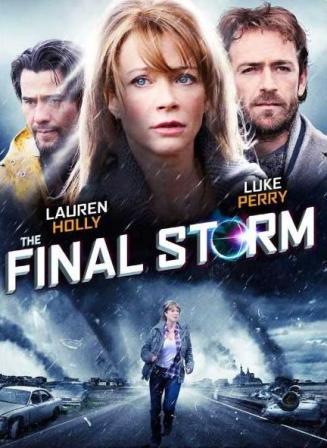
I’m a sucker for a good religious apocalypse film. Hell, as my love for The Omega Code will attest, I’m even more of a sucker for a bad religious apocalypse film. This leans more towards the former; both the religious and apocalyptic elements are significant, yet not overpowering: it certainly isn’t 2012-styled disaster porn. Tom (Bacic) and Gillian (Holly) live on an isolated farm with their son, Graham (Heppell), and watch with some discomfort on TV as the cities descend into chaos and the weather goes insane, too. Their concern is disrupted by the arrival on their doorstep during a storm, of a stranger on the verge of collapse.
He is Silas Hendershot (Perry), a polite, well-spoken young man with a fondness for Biblical scripture. Gillian takes to him, and insists he stays until things blow over, but Tom is less impressed, believing there’s something not quite right with their new visitor. However, concerns there have to go on the back-burner, as their neighbours have vanished. And when the family makes it into town, it is almost completely deserted too. Was there an evacuation and they missed it? Or is there something more apocalyptic happening?
Used as I am to Uwe’s more action-oriented works, this was a lot more restrained, especially once you get past the fairly gratuitous sex-scene near the start. If you missed the opening credits, this could be completely unrecognizable as an entry in the Boll filmography. Perry’s performance is solid, and pitched at the right level; while it was clear to me that Silas is a fruit-cake, I tend to think that of anyone who quotes the Bible. Rural isolation + religious fundamentalism = a particularly bad idea, as you’ll know if you’ve seen The Passion of Darkly Noon or Roman’s Bride.
However, I can see why his hosts are somewhat distracted, though I do have some questions, such as regarding the lack of cars in the town? If it’s some kind of rapture-esque event, did everyone have to drive to heaven? I did like that the script didn’t lay everything out for the viewer in simplistic terms, and except at the very end, it’s less about the apocalypse than how people would react to it. Much as in Night of the Living Dead, a theme is that, in the event of an external threat, that might not be the biggest peril – others facing the same threat may be a greater danger. Even an an agnostic, I appreciate the even-handed treatment of religion: both Tom and Seth have faith, in their own ways.
There’s a nice sense of escalation towards the ending, though I wasn’t quite as satisfied with that final reel. Things seem to get a little out of hand, and the movie is at its best exuding quiet menace, not shouting at you as the world goes down the plughole. which, while the jury may be out on whether it works (or even makes sense), is certainly one you’ll remember.
B-
1968 Tunnel Rats
Star: Nate Parker, Erik Eidem, Jane Le, Jeffrey Christopher Todd
In the Vietnam War, the Viet Cong set up and used a massive network of underground tunnels and chambers as bases, from which they could mount attacks on enemy forces. When discovered, the Americans would send in their “tunnel rats”: small of stature, lightly-armed soldiers to kill any lurking Viet Cong, and plant explosives to destroy the tunnels. Needless to say, this was a job fraught with peril, and subject to a high turnover. The latest batch of arrivals in the jungle from America have only a brief time to get to know each other, before going into action: the Viet Cong fight back, both above and below the dirt.
The film is at its best depicting the utterly claustrophobic nightmare of the underground battle, where the enemy might be about to attack from any angle, with booby-traps and flooding other hazards to contend with. The movie also doesn’t just treat the Vietnamese as “the enemy,” but does make some effort to show life from their side as well. For example, after Vo Mai (Le) takes out one of the soldiers with a sharpened bamboo stake [an impressively FM!RT! moment], she goes back into the tunnels and throws up. The final sequence, where she ends up having to team up with one of the Americans after a cave-in, is surprisingly poignant and effective.
The lack of any real “names” in the cast works for it – Boll regular Michael Paré, playing the squad commander, is the only recognizable face, making it harder to pick out obvious survivors. However, the characterization of the US soldiers is badly-handled, perhaps a result of the improvisation used in lieu of a script. The night of their arrival largely consists of them trading cliches with each other about what they’re going to do when they go home, how much they miss their mom’s cooking, and other activities which, from watching numerous war movies, we know are signing their death warrants. And once they get into the tunnels, it’s basically impossible to tell them apart.
It might have been wise if Boll had also not divided our attention between events beneath and on the surface. The latter provide s little we haven’t seen in every other ‘Nam flick, though the horror of an air-strike which arrives at about the worst moment possible is effective. From then on, perhaps because the high mortality rate has winnowed down the characters, the film is a great deal better, and I have to think that sticking with one or character, giving him proper depth, would probably been more effective and memorable.
C
Postal
Star: Zack Ward, Dave Foley, Chris Coppola, Jackie Tohn
Whoever said Germans have no sense of humour? Must be someone who’d watched this largely dreadful exercise in bad taste. It opens with the 9/11 hijackers debating the number of virgins they get after dying, and when they call Osama and are disappointed with the answer, decide to fly to the Bahamas instead – until the passengers charge into the cockpit, causing the plane to crash into the Twin Towers. Oh, hold my aching sides. About the only thing going for it is no-one will accuse the script of being prejudiced: it hates everyone. Rednecks, Muslims, even Germans – it’s nothing if not an equal-opportunity offender.
The story, such as it is, centres on a nameless guy (Ward), who lives in a trailer park with his immense, unfaithful wife, and has a generally wretched life. He goes to see his Uncle Dave (Foley), who is running a scam religion, but needs $1.7 million immediately, to fend off the IRS. They decide to steal a shipment of highly collectible penis-shaped dolls from the Little Germany theme-park, at an event where the special guest is Verne Troyer (a.k.a. Mini Me), unaware that Al Qaeda are intent on using the same dolls as part of a terrorist plot.
I laughed twice. I don’t mind broad humour – hell, I come from the land of pantomime and Carry On films – but this is juvenile to a painful degree; and, worse, just not funny. It’s crude parody, and is so patently trying to be offensive, that it largely fails to do so – for example, Foley straining, at length, to take a dump, while the hero watches and listens, embarrassed, nearby. The yawning gulf between this and truly scathing cinematic satire, such as Mike Judge or the South Park guys, is obvious in almost every sequence.
But, for the record, let me detail the two occasions on which I laughed out loud – and, admittedly, that’s more than some Hollywood comedies. The first was when Boll himself, as the owner of Little Germany, told someone critical of his venue, that his grandfather died in Auschwitz – he fell from a guard tower. Yes, it’s a very old joke, but hearing it told by am actual German, with obvious relish, enhances the shock value immeasurably. The other was a throwaway moment, where the hero uses a Persian cat as an impromptu silencer – though no cats were harmed in that particular scene. Even Uwe has his limits, it would appear.
D
Rampage
Star: Brendan Fletcher, Lynda Boyd, Matt Frewer, Shaun Sipos
Boll’s most critically-approved movie is currently scoring a 6.4 on the IMDB, though not everyone was impressed – I particularly liked the review there which said the film, “WALLOWS LIKE A FILTH ENCRUSTED SWINE DROWNING IN ITS OWN FECES.” And, yes, it was in all-caps. I’m going to use that line one of these days, but it won’t be here, as the film deserves praise for a relentless and unflinching portrayal of a one-man killing spree in a small town. It’s carried out by Bill Williamson (Fletcher), a 23-year old mechanic who has some issues – but, perhaps more interestingly, has a meticulous plan, both for the carnage and how it’s all going to end. He starts of by taking out the local police station, using a van packed with explosives, then picking off the remaining cops nearby, and only then turns his attention to the local civilians…
The film is only peripherally interested in the motivations for his actions. Bill doesn’t have a particularly bad life: he’s not bullied, the biggest problem in his life is his parents (politely) getting him to move out, and he doesn’t even appear to have the obvious cheap cop-out of playing violent video games or whatever. That may actually be one of the movie’s strengths, as any such explanation would inevitably fall short of the mark, so it’s perhaps best not even to bother. His ‘normality’ also makes the slaughter all the more uncomfortable, as there’s nothing obvious to separate and distance the killer from the viewer. Instead, he’s just like us – it’s a bit like Falling Down in that respect, particularly in the ‘bad service’ scene both films share.
Beyond that, however, it does lack much satirical edge, despite a delightful scene where Bill arrives in a local bingo-hall and… things don’t unfold as you’d expect. Mind you, having played that game, what transpires did have me nodding in acknowledgment of its plausibility and pitch-black humour. In contrast, the sequence in the beauty parlour is simply wrong – as an aside, it’s definitely worth hunting down the uncut version of the movie, which runs about five minutes longer, a good chunk of which seems to happen in the parlour. Having seen that scene in both versions, the uncut packs about ten times the wallop: I believe the ending may also be different.
Speaking of which, does the ending, with its twist, ring entirely plausible? No, though I can’t get into dissecting it in depth, for reasons of spoilage. Still, that, along with the overuse of not-very-Steadicam, are probably the biggest weaknesses; at least the shakycam doesn’t have the brutal force multiplier of frenetic editing, to make things even worse. [Chris still declined to view this one] But overall, this goes into a place that not many films have ventured, and contains more than enough scenes which will stick in your mind. It’ll be a while before we can pluck up the courage to suggest that our son moves out…
B
Seed
Star: Michael Paré, Will Sanderson, Ralf Möller, Andrew Jackson
While the DVD came with a copy of a PC video-game, this does not appear to have been based on a game. Still, this closeness may help explain the uneven nature here. There are two highly-memorable scenes – though as we’ll see, not necessarily in a good way – but these are countered by a muddled script that has little logic, even by the light standards of the “serial killers from beyond the grave” genre, and an approach to cinematography too often apparently reliant on a pack of Swan Vestas for lighting.
The villain is Max Seed (Sanderson), a killer responsible for the deaths of over six hundred people in a six-year period. He taunts police by sending them time-lapse footage of the decomposing bodies of his victims, from cockroaches to babies, but is eventually caught by Detective Matt Bishop (Paré). Sentenced to death by electric chair, Seed survives three attempts – according to state law, he can’t be executed again, so Bishop pretends Seed is dead and has him buried in the prison grounds anyway. When the killer digs his way out of the earth and resumes his spree, Bishop has to find the “copy-cat” before Seed takes very personal revenge on the man who sent him to a premature grave.
The flaws in the plot are almost too numerous to list, but here are a sample:
* How does Seed have time to take multiple, lengthy time-lapse videos, which must take months to shoot, and still kill about one person every three days?
* Why is he allowed to keep his serial-killing mask on, right up until execution?
* The guy kills over 600 people – and a “copy-cat” another 60-odd – and Bishop is apparently the only guy investigating?
* The “three strikes and you’re free” rule claimed to be “state law” at the start of the film, is complete BS.
* Cops will split up, and go off entirely on their own when searching a pitch-black serial killer’s house.
And that’s aside from the whole unkillable killer thing; you’d think having his eyes pop thanks to the application of 15,000 Volts might slow you down a bit. Apparently not.
The scenes in the house seem to go on for hours, and you’ll be forgiven if you fall to sleep during these. The film only comes to life and claws its way back from the dead when Seed does. There is one scene which is simply brutal: he has tied up a woman and starts off tapping her with a hammer, but it escalates to an utterly savage bludgeoning – all done, apparently, in one shot. You keep expecting the camera to cut away – but it doesn’t. It goes on. And on. “The point for me was to make a movie that is completely uncompromising,” Boll told Fangoria in October 2006. For that shot at least, it’s a success – qualified only by the fact that we don’t know who the victim is, which limits the emotional attachment. However, the ending is so completely bleak, it also backs up the intent.
The first shot, however… For Boll has used footage of 100% genuine animal cruelty. Sure, he obtained it from PETA themselves, but I really think the justification for it here is pretty slim. Especially as an opening gambit, the result comes across nothing more than a cheap attempt to shock. Albeit a successful one, since the footage is pretty difficult to watch, even if I’m more a cat person, shall we say. But if you’re going to do this, you need to have a clear purpose; simply having your psycho watching it, as here, isn’t enough.
C
Stoic
Star: Edward Furlong, Sam Levinson, Steffen Mennekes, Shaun Sipos
There’s something about this which feels like a stage production, more or less being one set and four characters. The set is a jail cell; the characters, inmates who start off playing poker. Then a harmless joke bet, to eat a tube of toothpaste, is reneged on by its instigator, Mitch (Sipos). The other three force him to carry out his obligation, and things then quickly escalate from there, particularly after Mitch makes a break for the alarm buttons and tries to alert the guards. Retribution is swift and terrible. Leading the instigation is German skinhead and arsonist Jack (Mennekes), along with scrawny, psychopathic armed robber Harry (Furlong). Reluctantly going along – mostly for fear they’ll turn on him – is the final cellmate, Peter (Levinson), who comes up with the idea of faking Mitch’s death and making it look like suicide…
Boll seems adept at pushing Chris’s buttons: the scene where Mitch is forced to eat his own vomit got her scurrying out of the room this time. A lot of this is certainly difficult to watch, although one wonders what kind of jail it is, where the guards apparently never check on the inmates. The performances are solid, with Levinson coming out best, though Furlong certainly isn’t someone with whom I’d like to be locked up; it appears the dialogue was mostly improvised, and it certainly has a natural flow. While Boll breaks out the hand-held cameras again, at least this time, they aren’t being waved around like Leatherface wielding his saw, and I don’t think this had much to do with my wife’s early exit.
The main problem is that I don’t quite get what the point is intended to be here. People in jail do unpleasant things? Peer pressure is bad? Whatever it was, and even though this was based on a true story from a German juvenile detention facility, the end seems to fall some way short of justifying the sight of Mitch getting a broom handle shoved up…well, his end. It did provoke a discussion with Chris about what we might do in a similar situation, where you are forced to participate, or risk becoming the next victim. While it’s a topic that certainly merits some contemplation, much the same ground was covered, to better effect, in Shellter. The main thought I take away from this, is that I probably wouldn’t do very well in prison.
C+
What do we have? A mixture. Some good films, some bad: from terri-boll to lauda-boll [what, you expect me to get through 4,000 words without a Boll joke?] In other words, pretty much what every other director has produced, from David Cronenberg to Fred Olen Ray, and objective evidence for him being the 21st-century Ed Wood is kinda slim. What I certainly did see, was a director who – particularly when he isn’t adapting video-games – is stretching out beyond the genres with which he is associated, and seems to be making perceptible progress as a film-maker. That’s certainly a great deal more than you can say about many working in Hollywood.
Take his upcoming movies: it’d be hard to find a more diverse bunch. He’s going back to the video-game well (sigh…) for Bloodrayne: Third Reich, doing a comedy about a fat superheroine, Blubberella…and then there’s Auschwitz, which seems to be exactly what it sounds like. He shot that back to back with Bloodrayne, since he already had the sets and uniforms, and according to Boll, “It was an opportunity to make something that nobody would ever finance, but is necessary to make.” After the guard-tower crack in Postal, I wasn’t sure Boll was the right person to do a serious movie, but having subsequently seen Darfur, I’m a good deal more certain he might be able to handle it. There is a big step, however, from a genocide that, unfortunately, few care about, to The Big One. Will Boll be able to make the leap? Stay tuned.
